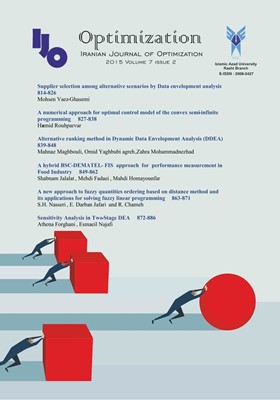Sensitivity Analysis in Two-Stage DEA
Subject Areas : Data Envelopment AnalysisAtena Forghani 1 , Esmaeil Najafi 2
1 -
2 -
Keywords: Sensitivity analysis, Two-stage DEA, Weighted sum model, Combined DEA model,
Abstract :
Data envelopment analysis (DEA) is a method for measuring the efficiency of peer decision making units (DMUs) which uses a set of inputs to produce a set of outputs. In some cases, DMUs have a two-stage structure, in which the first stage utilizes inputs to produce outputs used as the inputs of the second stage to produce final outputs. One important issue in two-stage DEA is the sensitivity of the results of an analysis to perturbations in the data. The current paper looks into combined model for two-stage DEA and applies the sensitivity analysis to DMUs on the entire frontier. In fact, necessary and sufficient conditions for preserving a DMU's efficiency classiffication are developed when various data changes are applied to all DMUs.
[1] Ahn, T.S., Seiford, L.M. (1993). Sensitivity of DEA to models and variable sets in a hypothesis test setting: The efficiency of university operations. In: Yuji, I. (Ed.), Creative and Innovative Approaches to the Science of Management, Quorum Books, New York, pp. 191 − 208.
[2] Charnes, A., Cooper, W.W., Golany, B., Seiford, L.M., Stutz, J. (1985). Foundation of data envelopment analysis for Pareto-Koopmans efficient empirical production functions. Journal of Econometrics 30, 91 − 107.
[3] Charnes, A., Cooper, W.W., Rhodes, E. (1978). Measuring the efficiency of decision making units. European Journal of Operational Research 2, 429 − 444.
[4] Charnes, A., Haag, S., Jaska, P., Semple, J. (1992). Sensitivity of efficiency classifications in the additive model of data envelopment analysis. International Journal of Systems Science 23, 789 − 798.
[5] Charnes, A., Rousseau, J., Semple, J. (1996). Sensitivity and stability of efficiency classifications in data envelopment analysis. Journal of Productivity Analysis 7, 5 − 18.
[6] Charnes, A., Neralic, L. (1990). Sensitivity analysis of the additive model in data envelopment analysis. European Journal of Operational Research 48, 332 − 341.
[7] Chen, Y., Cook, W. D., Li, N., Zhu, J. (2009). Additive efficiency decomposition in two-stage DEA. European Journal of Operational Research, 196(3), 1170 − 1176.
[8] F¨are, R., Grosskopf, S., Lovell, C.A.K. (1994). Production Frontiers. Cambridge University Press, Cambridge.
[9] Andersen, P., Petersen, N.C. (1993). A procedure for ranking efficient units in data envelopment analysis. Management Science 39, 1261 − 1264.
[10] Kao, C., Hwang, S. N. (2008). Efficiency decomposition in two-stage data envelopment analysis: An application to non-life insurance companies in Taiwan. European Journal of Operational Research, 185(1), 418 − 429.
[11] Neralic, L. (1994). Sensitivity analysis in data envelopment analysis: A review. In: Rupnik, V., Bogataj, M. (Eds.), Proceedings of the Symposium on Operations Research, SOR ’94, Portoroz, pp. 29 − 42.
[12] Rousseau, J., Semple, J.H. (1995). Radii of classification preservation in data envelopment analysis. Journal of the Operational Research Society 46, 943 − 957.
[13] Seiford, L.M., Thrall, R.M. (1990). Recent developments in DEA: The mathematical programming approach to frontier analysis. Journal of Econometrics 46, 7−38.
[14] Seiford, L.M., Zhu, J. (1998a). Stability regions for maintaining efficiency in data envelopment analysis. European Journal of Operational Research 108 (1), 127−139.
[15] Seiford, L.M., Zhu, J. (1998b). Sensitivity analysis of DEA models for simultaneous changes in all the data. Journal of the Operational Research Society 49, 1060−1071.
[16] Seiford, L.M., Zhu, J. (1999). Infeasibility of super eciency data envelopment analysis models. INFOR 37(2), 174 − 187.
[17] Smith, P. (1997). Model misspecification in data envelopment analysis. Annals of Operations Research 73, 233 − 252.
[18] Tarja Joro, Pekka Korhonen and Jyrki Wallenius(1998). Structural comparison of data envelopment analysis and multiple objective linear programming, 30(9), 1078− 1092.
[19] Zhu, J. (1996). Robustness of the efficient DMUs in data envelopment analysis. European Journal of Operational Research 90, 451 − 460.
[20] Zhu, J. (2001). Theory and Methodology Super-efficiency and DEA sensitivity analysis. European Journal of Operational Research 129 443 − 455.


